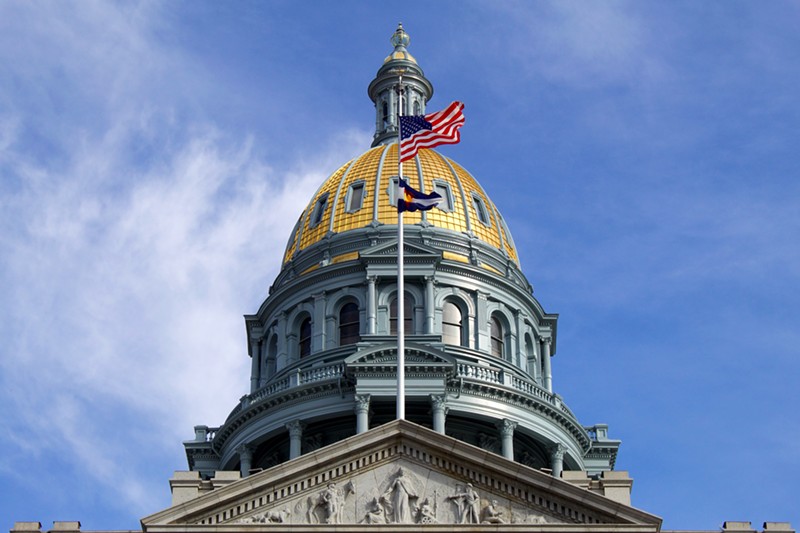Colorado legislators gathered at the State Capitol on Wednesday, January 10, to begin 120 days of lawmaking. This first day is reserved for speeches promising to make the state a better place, technical resolutions and introducing the first 100-plus bills of the 600 to 700 that will come during the session.
Just thirty minutes into the morning's proceedings, however, shouts from the gallery flooded the House floor: "Members of the legislature, we are three months into a genocide!" one man screamed. It was a coordinated protest, with several people stationed in different parts of the room standing one at a time, waving Palestinian flags, yelling calls for a ceasefire in the Israel-Hamas war and accusing the legislators of being complicit in the deaths from the conflict.
Security hurriedly pushed the protesters into the hall, but not before the Republican caucus walked out of the House chamber, blaming Democratic leadership for the situation in a post on X: "The Speaker’s 'decorum' has lasted a full 39 minutes. We’re in for a long 120 days."
The issue of decorum was front and center. In her opening speech, House Speaker Julie McCluskie named prioritizing civility her top goal for the year.NOW: Pro-Palestine protestors disrupt first day of Colorado’s 2024 legislative session, waving flags, yelling “shame on you,” “you’re complicit,” “ceasefire now.”
— Hannah Metzger (@hnmetzger) January 10, 2024
Republican legislators walk out of chamber.
Protestors removed after a few minutes. Work continues without comment. pic.twitter.com/prpMRoVoZt
Just two days before the session started, McCluskie had formally reprimanded Democratic Representative Elisabeth Epps for her actions during the special session in November, when she joined a group of pro-Palestine protesters and shouted over a speech by a Republican legislator who she says cursed at her for saying "Free Palestine" during a bill debate.
"We can engage on tough issues without disregarding the humanity and dignity of our colleagues or accusing each other of poor motives," McCluskie said Wednesday. "Where we have fallen short in the past, we must redouble our efforts to do better this session."
Epps was one of only two House representatives who attended the first day of the session virtually; the other was Representative Stephanie Luck, who is expected to give birth soon. Epps declined to tell Westword why she didn't show up on Wednesday.
But Epps was definitely there in spirit: While McCluskie implored lawmakers to "get off of social media and have real conversations with one another" in her speech, Epps live-tweeted the morning's proceedings, heavily criticizing the speaker.
In one post, Epps said the speaker "watched poverty porn" after McCluskie mentioned visiting an eviction court over the summer. In another, she called McCluskie's speech "deceptive" for suggesting support for banning evictions without just cause, an effort Epps claimed is predetermined to fail. Epps also made many posts condemning the decision to turn off the audio of the House's live feed when the Palestine protest started.
"It is the people’s House and the people of Colorado deserve to watch you go all out to silence dissent," Epps wrote, later adding: "They lie on our living, lie on our dead, and cut the feed so the people can’t see. SHAMEFUL."
The division didn't end with social media. While votes held on the first day of the session are largely to pass technical resolutions needed to get work started, only one of the House's first six motions passed unanimously.
Seven legislators voted against a resolution to schedule Governor Jared Polis's annual State of the State address, set for the House chamber on January 11. Eleven voted against consolidating two health committees. Thirteen voted against aligning committee oversight responsibilities to reflect the consolidation. Two of the three motions to permit the lawmakers to vote on the proposed resolutions even received some "no" votes.
Representative Richard Holtorf says he voted against the resolution to schedule the State of the State in protest of the event itself, saying the governor always promises bipartisanship during his address only to "ramrod" progressive policies during the session without input from Republicans.
"I am not happy with the governor, and the past State of the State addresses have been riddled with misspeak and promises of bipartisanship that have fallen way short of my expectations," Holtorf says. "I'm tired of all the talk of how we're going to be Republicans and Democrats shoulder-to-shoulder solving the problems of the state. When the session starts, that's all a bunch of bunk."
Only four legislators voted against all three of the resolutions: Epps and Republican representatives Ron Weinberg, Ken DeGraaf and Scott Bottoms.
Bottoms is in the middle of a suit against McCluskie and Governor Polis, trying to block a law to increase the earned income tax credit, because he claims House leadership didn't let him speak on the bill when legislators passed it during the special session in November.
It's one of several legal challenges facing the legislature. Just last week, a judge ruled that legislators can no longer use a secret ballot to determine their budget priorities, something the Democratic caucus has done since 2019. In September, House leadership settled a lawsuit filed by Epps and Representative Bob Marshall, claiming the caucuses regularly violated state open-meetings law with secret meetings and disappearing messaging apps. McCluskie cut Epps and Marshall from a top committee this session, though she claims it's not in response to the lawsuit.
McCluskie called out a different lawsuit in her speech on Wednesday: a Republican-backed effort to overturn a ban on ghost guns.
"We will not let a fringe group’s lawsuits against the good work of this body deter us from saving lives," she said — receiving a standing ovation from Democratic lawmakers and cold silence from the Republicans.
Outside of some unusual behavior, the opening day of the 2024 legislative session was also unique for the number of new lawmakers present. Though 2023 wasn't an election year for legislators, three newbies started their first regular session on Wednesday: Representatives Tim Hernández, Manny Rutinel and Chad Clifford. Senator Dafna Michaelson Jenet also started her first session as a senator instead of a representative.
The new faces resulted from a whopping eight state lawmaker resignations in 2023, two just weeks before the 2024 session started. The seat representing House District 31 sat empty on Wednesday, awaiting a vacancy election scheduled for January 18.
Many of the resigning legislators said their decision to leave was influenced by the "vitriol" and "toxicity" in the Colorado Legislature in 2023. With this start, 2024 might not look much different.












